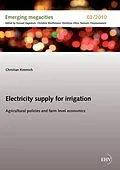This report focuses on the policies of electricity provision for irrigation and the cost of groundwater-based irrigation. The empirical ndings indicate that electricity regulation is unlikely to full the expectations of an allocation-ecient tari structure in the given political situation, leading to regulatory capture. The report's chronological approach reveals development paths that are also present in the current action situations. The ndings suggest that the involved properties of transactions inherent in the choices available to each actor are constitutive for understanding the unfolding of each potential and the realised development path. The economic conditions of dry-land agriculture and the costs of food provision render a shift towards a cost-based tari setting unlikely. The analysis at the level of electricity distribution and agricultural production systems indicates that although marginal costs of electricity supply are inexistent, the costs for the consequences of poor infrastructure incur heavy burdens on agricultural enterprises. The costs of electricity would exceed those for each of the other input factors of production. The absence of marginal costs has led to highly inecient groundwater irrigation. Fortunately, incentives in agriculture for higher power quality are given, resulting from the high costs of pump set burnouts through voltage uctuations. This incentive can be combined with energy eciency measures. Eective measures are most feasible at the level of the electricity sub-station, isolating an agricultural electricity feeder and the connected distribution transformers.
Titel
Electricity supply for irrigation
Untertitel
Agricultural policies and farm level economics
Autor
EAN
9783867418409
ISBN
978-3-86741-840-9
Format
E-Book (epub)
Hersteller
Herausgeber
Veröffentlichung
11.01.2013
Digitaler Kopierschutz
Wasserzeichen
Anzahl Seiten
32
Jahr
2013
Untertitel
Englisch
Unerwartete Verzögerung
Ups, ein Fehler ist aufgetreten. Bitte versuchen Sie es später noch einmal.
